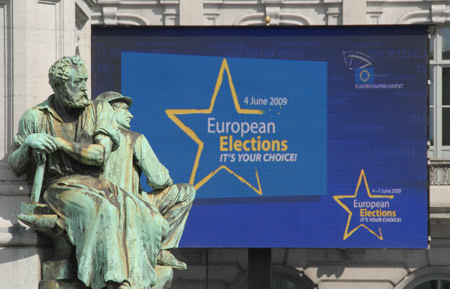Center-left parties seem to turn out to be the biggest losers in the European Parliament elections, which wrapped up on Sunday across the continent, while the center-right group will return as the biggest bloc.
The European People's Party and European Democrats (EPP-ED), the center-right political group, will win between 263 and 273 seats in the new chamber, provisional results released by the European Parliament show.
 |
|
Statues are seen in front of a screen poster of European Parliament elections in Brussels, Belgium, June 7, 2009. EU member countries like Belgium, Germany, France and Poland held EP elections Sunday, the last day of the 7th EP elections. Preliminary figures showed a historical low voters' turnout during the elections. [Wu Wei/Xinhua]? |
The EPP-ED won 282 seats in the 785-seat house in 2004. The number of seats in the 2009 assembly is reduced to 736.
The Socialist Group in the European Parliament (PSE), the major center-left force, will take only between 155 and 165 seats, compared to 203 seats in 2004.
The Alliance of Liberals and Democrats for Europe (ALDE) will remain in the third place with 78 to 84 seats. The group won 86 seats in the 2004 elections.
The right-wing Union for Europe of the Nations is winning handsomely with 33 to 37 seats in the new parliament, probably due to the record low voter turnout of only 43 percent. The group won only 23 seats in the 2004 elections.
The left-wing European United Left -- Nordic Green Left is expected to remain stable while the Greens bloc will gain.
The Independence/Democracy Group, a bloc of euroskeptic and eurorealist political parties, is suffering big losses. The group will get only 15 to 19 seats, compared to 36 in 2004.
Voters from 19 of the 27 European Union (EU) nations -- including France, Germany, Italy and Spain -- cast ballots on Sunday, the final day of the elections. British and Dutch voters were the first to go to the polls on Thursday.
(Xinhua News Agency June 8, 2009)